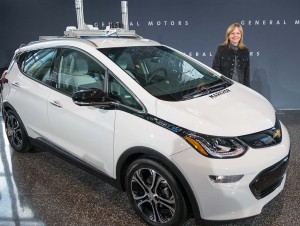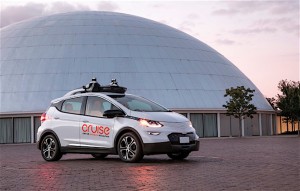
The Chevy Bolt will be General Motors first fully autonomous car when it brings a self-driver to the market in the future.
Shares of General Motors posted their biggest gain in years, rising nearly 13% Thursday on news that Japanese tech investment fund SoftBank was investing $2.25 billion in GM’s autonomous vehicle development subsidiary, Cruise Automation.
SoftBank’s big investment was one of several major announcements yesterday that underscored the growing interest in self-driving vehicles. Waymo, the spinoff of Google, said it would purchase as many as 62,000 Chrysler Pacific Hybrid minivans for use in its planned self-driving ride-sharing service. Currently in a pilot program, it intends to begin commercial operations in Phoenix later this year and then begin a national rollout.
GM plans to launch a similar ride-sharing operation through another subsidiary, Maven, using versions of its all-electric Chevrolet Bolt EV modified by Cruise. Mary Barra, the automaker’s CEO, said GM will look at “other opportunities” for Cruise that could involve alliances with other companies SoftBank has funded, including Uber and China’s Didi Chuxing.
General Motors shares closed at $42.70 on Thursday, up $4.87, or 12.9%. That was still off from the stock’s 52-week high of $46.76, but marked its best gain ever since emerging from bankruptcy in 2009.
(SoftBank invests $2.25B in GM’s autonomous tech. Click Here for the story.)

Cruise Automation introduced its third-gen automated vehicle. They will be part of the new New York City fleet.
And it served as validation of what had been a controversial deal when GM purchased San Francisco-based Cruise two years ago for $1 billion, asserting that it needed the new subsidiary to help it catch up to self-driving technology leaders like Waymo, the Alphabet subsidiary that is seen as one of, if not the, leader in autonomous technology.
Virtually every major automaker is now working on autonomous vehicle development, some independently, others by partnering with tech companies and automotive suppliers, such as Aptiv – formerly known as Delphi – and Germany’s Continental. A number of new players have also entered the field, including Tesla, which already offers its semi-autonomous Autopilot system. Tesla CEO Elon Musk recently said he expects to debut a fully hands-free version in 2019.
Many experts anticipate a shake-out as the technology comes closer to reality, with a handful of companies providing technology to a range of client carmakers. That appears to be part of the strategy that Waymo has in mind. Early on, it had considered developing vehicles of its own, even partnering with Detroit-based auto supplier Rousch to produce about 100 bubble-shaped “Google Cars.”
But CEO John Krafcik has now decided that Waymo will instead partner with companies like Fiat Chrysler Automobiles, as well as Jaguar Land Rover. Two months ago, Waymo announced it would acquire “up to” 20,000 of JLR’s new all-electric I-Pace utes to convert to autonomous operation.

Cadillac's Super Cruise semi-autonomous system is now available with an eye toward making it fully self-driving in the future.
(Click Here for details about Waymo agreeing to purchase 62K Chrysler Pacifica hybrid minivans.)
While some players hope to offer fully hands-free technology for retail customers, others are focusing on fleets, both commercial trucks and ride-sharing services.
Uber, which has its own ride-sharing project, has predicted that fully driverless vehicles will push the cost of offering rides down so low that it will be viable alternative to owning a private vehicle for millions of motorists.
GM appears to be hedging its bets. It recently launched the semi-autonomous Super Cruise for its Cadillac brand and hopes to update that to full hands-free operation during the next few years. But it also wants its Cruise Automation unit to develop fully driverless vehicles that can be rolled into its Maven vehicle-sharing service. GM President Dan Ammann has said that he expects to see the first of those driverless Chevy Bolts begin operation in 2019.
GM also is expected to make its technology available to other car manufacturers and services, one potential benefit of the tie-up with SoftBank.
(To see more about 74% of Americans being “too afraid” to ride in self-driving vehicles, Click Here.)
Eventually, said analyst Joe Phillippi, of AutoTrends Consulting, GM will likely float Cruise in an IPO to further monetize the subsidiary.
